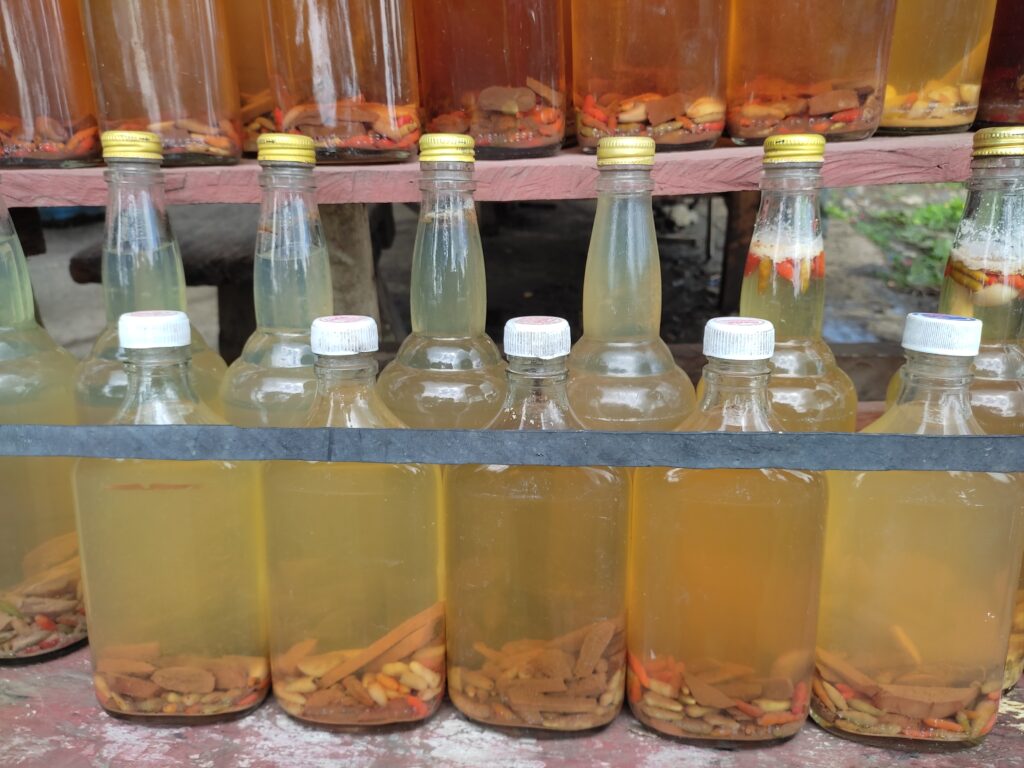Text and Photos by Henrylito D. Tacio
Watch out for the vinegar you buy in the malls or public markets. They may not be the real thing. According to a study done by a line agency of the Department of Science and Technology (DOST), eight out of 10 vinegar products sold in the local markets contain “fake ingredients” and thus could be harmful to consumers.
Researchers from the Philippine Nuclear Research Institute (PNRI) use isotope-based analytical techniques to distinguish vinegar and other condiments from natural or plant-based sources from those which are derived from petroleum-based sources.
“Condiments usually undergo the process of fermentation, and the raw materials must come from fruits and other natural products,” explained Raymond Sucgang, head of the PNRI Nuclear Analytical Techniques Applications Section.
His research team was totally surprised by their findings. “One can only imagine all the impurities and residues from the petroleum by-products which can be the source of various degenerative diseases,” pointed out Sucgang.
In producing these “fake” and adulterated vinegars, synthetic acetic acid is reportedly used. Produced chemically by the reaction of methanol with carbon monoxide, it is used as a solvent for paints and resins.
As acetic acid comes from fossil fuels and by-products in the production of diesel and oil, it is very dirty. As such, products containing this inorganic type of acid are dangerous to human health.
“Synthetic acetic acid should not be used in food production or as condiment,” Sucgang said, adding that products containing synthetic materials have impurities, “and these impurities, according to medical journals, can cause cancer and degenerative diseases like Parkinson’s.”

Vinegar, defined as a liquid fit for human consumption and contains a specified amount of acetic acid and water, has long been used around the world as a basic seasoning in the preparation of cooking of certain foods because its sharp taste makes it so useful and versatile.
“Vinegar adds flavor to vegetable and meat products,” M. Plessi wrote in Encyclopedia of Food Sciences and Nutrition. “It is one of the ingredients of salad dressings, sauces, such as tabasco and tomato products, such as ketchups, mustard, and aspics. Mixed with oil and salt, it makes the classic vinaigrette, and it can be used as a condiment for salad and as a sauce for cold, cooked vegetables, meat and fish.”
Vinegar is one of the oldest fermentation products known to man as its history dates back to around 2000 BC, having been considered for a long time as the poor relative among fermented food products. It was used by ancient Egyptians, Greeks, and Romans.
It was a French microbiologist and chemist Louis Pasteur who first noted the formation of acetic acid from ethanol by acetic acid bacteria. The reaction has been termed “acetic acid fermentation” and requires the presence of oxygen.
“(Vinegar) is produced from raw materials of different agricultural origin containing starch and sugars, that are subjected to a process of double fermentation, alcoholic, and acetous,” says the book Fermented Foods in Health and Disease Prevention.
Among the raw materials that can be used in producing vinegar are cider, grapes or wine, coconut wine or tuba, molasses, sorghum syrup, honey, fruits, maple syrup, sugarcane, palm, potatoes, malt, grain, and whey.
Vinegar is made through the fermentation of ethanol alcohol. “Bacteria are used to ferment (or break down) the ethanol into by-products including acetic acid,” wrote Bethany Moncel in an article. “This acetic acid is what makes vinegar unique, although it contains other substances including vitamins, minerals and flavor compounds.”
According to naturalfoodseries.com, 100 grams of vinegar contains the following nutrients: acetic acid, 5 grams; calcium, 7 milligrams; carbohydrates, 1 gram; energy, 21 kilocalories; iron, 0.2 milligrams; magnesium, 5 milligrams; phosphorus, 8 milligrams; sodium, 5 milligrams; and sugar, 0.4 grams.
Vinegar is one of the most useful products that can treat various health problems. “Vinegar amazing benefits includes treating allergies, balancing alkali, fighting microbial, treating hypertension, fighting cancer, fighting oral bacteria, promoting hair growth, maintaining skin elasticity, lowering high blood sugar, helps burn fat, helps reduce cholesterol level, relieves acid reflux, and improves gut health,” writes Michael Jessimy, author of “Amazing Health Benefits of Vinegar.”

